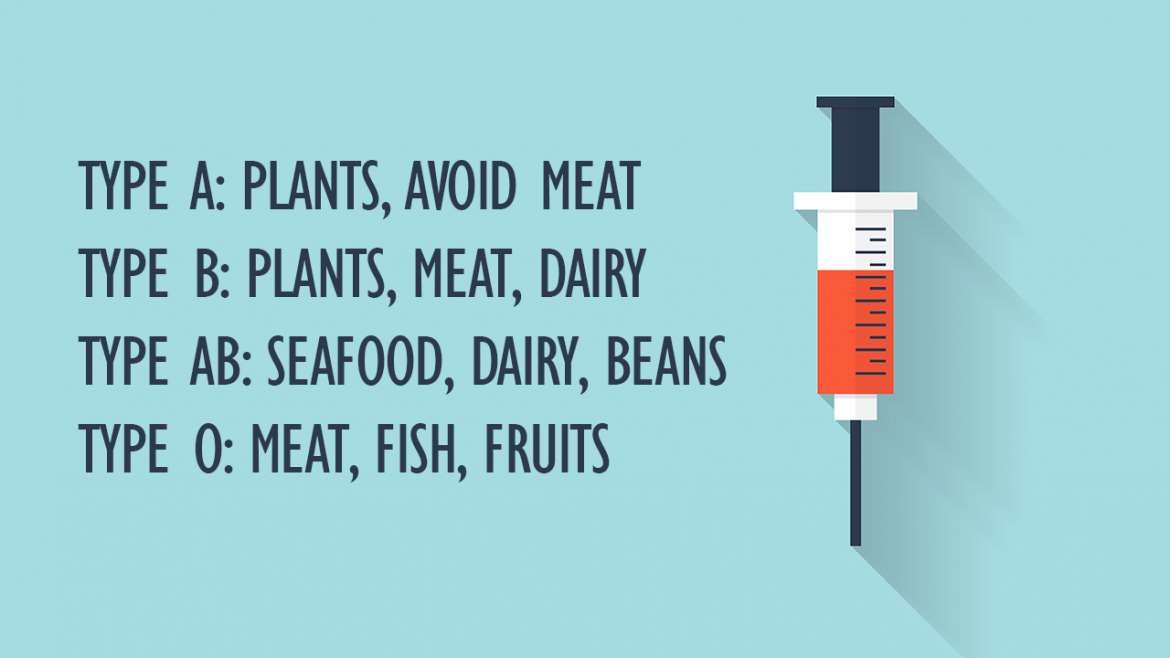The Blood Type Diet first appeared in 1996 and has been around for more than two decades now. Followers of the diet will tell you that your blood type determines what you should eat and how food affects your health.
But is the blood type diet based on any solid evidence?
That’s what this post is all about…
What is The Blood Type Diet?
The blood type diet is based on the 1996 bestseller book “Eat Right 4 Your Type” by Dr. Peter D’Adamo. Basically D’Adamo suggested that a person’s ideal diet depends mostly on their blood type. His assumption is based on the glycoprotein content of foods.
Glycoproteins, and more specifically lectins, are specific protein structures in our diet, which in certain cases can resemble antibodies of our blood group.
D’Adamo believed that specific combinations of these lectins could produce harmful reactions in the body, especially the clumping of antibodies in your blood.
He suggested that this can lead to all kinds of diseases, whereas a diet adapted to one’s own blood group will prevent clumping of antibodies and promote health.
This is how each blood type is supposed to eat:
Type A (“the agrarian or cultivator”): A diet rich in plants, while avoiding red meat. This is similar to a vegetarian diet.
Type B (“the nomad”): These people should avoid foods like wheat, corn, lentils, and tomatoes while focusing on plants, specific types of meat and dairy.
Type AB (“the enigma”): These people are a mix between types A and B. They should follow a diet rich in seafood, tofu, dairy, beans and grains but avoid kidney beans, beef, chicken and corn.
Type O (“the hunter”): A diet high in protein with a focus on meat, poultry, fish and fruits and vegetables. This is similar to the paleo diet.
Lectins: Are They Really Bad For You?
Like I said before, the central hypothesis of the blood type diet is that certain lectins target different blood types. So if you eat foods not appropriate for your blood type this could lead to a clumping of red blood cells.
So far, this isn’t completely false, as there is evidence that lectins in raw, uncooked legumes can have this effect on different blood types. For example, lectins found in uncooked lima beans might interact only with the blood from people with blood type A.
But this only applies to a small percentage of all the lectins and the majority of them react with all blood types. What’s more is that legumes are usually soaked and pretty much always cooked before you eat them.
This destroys harmful lectins, which means D’Adamo hypothesis doesn’t have much real-world relevance.
Scientific Studies On The Blood Type Diet
Because the blood type diet is so popular there have been several studies that looked into its validity.
There is evidence that people with different blood types can have a higher or lower risk of some diseases, which might be an indicator that the blood type diet is based on solid scientific evidence.
The problem is that so far no study has shown that these differences in risks are connected to your eating habits.
In fact, there is pretty strong evidence against the blood type diet. One study of over 1400 young adults found eating the type A diet showed improved their health markers, but this happened in everyone, not just those with type A blood type.
A 2013 review of the literature on the blood type diet actually concluded that there is no scientific evidence to support the blood type diet.
That’s the scientific equivalent of a death sentence for any theory.
Before I end this post I want to address one last question…
If there is no evidence supporting the blood type diet, why is it so popular?
The Blood Type Diet works like most fad diets. It severely restricts what you can eat and eliminates most processed and junk food from your meal plan. This alone makes a lot of people lose weight and be healthier.
Many of them attribute these positive changes to eating according to their blood type when in fact any diet based around whole and unprocessed foods would have achieved the same.
Of course, different diets work for different people and if you feel the blood type diet works for you then go for it. Just understand that the evidence is stacked behind traditional recommendations for healthy eating and not restrictions based on your blood type.



